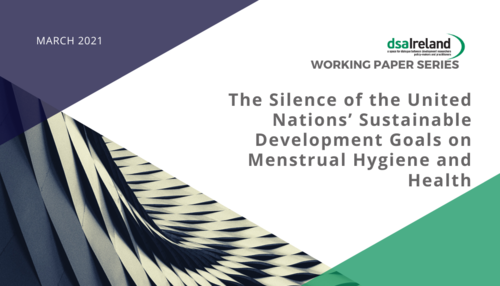DSAI are delighted to publish the latest in our Working Paper Series - ‘The Silence of the United Nations’ Sustainable Development Goals on Menstrual Hygiene and Health’ by Kirsty Nash.
Kirsty is graduate of BSc International Development and Food Policy, University College Cork. In 2019 she worked in Northern Malawi with Irish community development NGO Wells for Zoë in 2019 where she was involved in the facilitation of sexual and reproductive health education and reusable sanitary pad workshops with adolescent girls. She is currently advancing her research and advocacy around menstrual health and hygiene, sexual and reproductive health and rights, and gender equality in the Global South; pursuing an MSc in Global Health Policy at the University of Edinburgh.
Her research and paper indicates that menstrual health initiatives must extend beyond sanitation and hygiene, encompassing broader outcomes of human rights, well-being, and education, to ultimately overcome deeply rooted menstrual stigma. She goes on to make recommendations for the integration of Menstrual Health and Hygiene into the 2030 Sustainable Development Agenda.
The DSAI Working Papers series constitute work-in-progress publications for high quality research, not previously published elsewhere. The series aims to encourage discussion, contribute to the advancement of knowledge, and to inform the conceptual and empirical basis for policy-making.
This paper highlights an important gap in the United Nations' Sustainable Development Goals with respect to addressing gender-based inequality. The paper draws upon the current literature on the subject of reproductive health and hygiene with a focus on menstrual health and hygiene management, which continues to be met with shame, stigmatization and at best a lack of practical support, hereby holding women and girls back in terms of achieving SDG targets in relation to health, education and human rights. The paper concludes with an appeal for the need to bring urgent focus to women’s menstrual hygiene and health as a precondition to achieving the Goals. Speaking of their acceptance of Kirsty’s paper for publication, the editorial team noted;
“This was a high calibre submission to Working Paper Series, that demonstrates pioneering Irish research in a global context. It identifies a really crucial gap in the SDGs and is extremely timely and relevant, both as a piece of research and as a call for action. It has significant potential for policy impact and we will follow Kirsty’s ongoing research with interest.”
The DSAI Working Paper Series accepts submissions all year round, and affords researchers an important mechanism for disseminating their research and opportunity to have work in progress blind-peer reviewed by experts in the field. Interested authors can review Guidelines for Submissions here.
